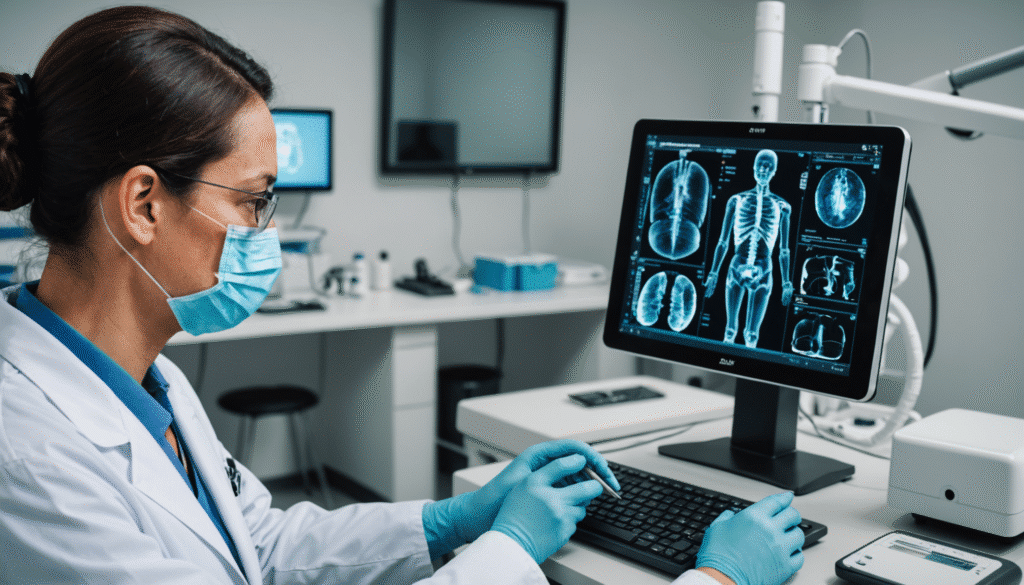In the field of medical innovations, every advancement can transform lives. The introduction of artificial intelligence in healthcare opens up new perspectives. Qure.ai, a leading Indian company, has recently unveiled a revolutionary solution.
This solution, named AIRA, is designed to optimize resources in often resource-limited primary care environments. Powered by large language models trained on data from health systems in low- and middle-income countries, AIRA assists community health workers by automating patient data collection, including symptoms and medical history. Additionally, it aggregates population-level insights and supports adherence to clinical protocols while providing decision support. This innovation is crucial, as primary health systems in developing nations are overwhelmed by a high volume of patients and increasing demand for care, often without sufficient resources.
According to Qure.ai, there are estimated to be 17 million avoidable deaths in these countries and a projected shortage of 11 million health workers by 2030. Meanwhile, over 40% of community health workers’ time is spent on manual data collection, while countries lack population-level data to make informed decisions. AIRA addresses these challenges by freeing healthcare professionals from manual data collection, allowing them to focus more on patient interactions and improve adherence to clinical protocols. Prashant Warier, founder and CEO of Qure.ai, states: “AIRA in the hands of every healthcare professional will allow them to spend more time on patient interactions through automated data collection and better adherence to clinical protocols.”
Launched after QureOS, a sandbox operating system for AI providing a unique environment to explore, test, and deploy various AI applications from suppliers around the world, AIRA fits into a broader trend aimed at accelerating AI adoption in healthcare in low- and middle-income countries. Introduced in March, QureOS enables health systems in these regions to more easily integrate innovative AI solutions. The Indian startup, valued at $250 million, is already participating in various public health screening programs, including for tuberculosis, stroke, and lung cancer, in collaboration with major health and pharmaceutical companies such as Johnson & Johnson, Medtronic, and AstraZeneca.

“`html
What is qure.ai and aira?
Qure.ai, an Indian company specializing in medical imaging assisted by artificial intelligence, has recently unveiled AIRA, an innovative AI co-pilot designed for community health workers. This revolutionary tool is powered by advanced language models trained on data from health systems in low- and middle-income countries. AIRA aims to automate the collection of patient data, including symptoms and medical history, while aggregating population-level insights.
Thanks to AIRA, healthcare professionals can not only save time by avoiding manual data entry but also improve adherence to clinical protocols. By providing decision support based on robust data analyses, AIRA facilitates informed decision-making, thereby contributing to better resource management in often constrained environments.
According to a statement from Prashant Warier, founder and CEO of Qure.ai, “AIRA in the hands of every health worker will free their time for deeper interactions with patients through automated data collection and better adherence to clinical protocols.”
How does aira optimize resources in primary care?
Primary health systems in developing nations are often overwhelmed by a high volume of patients and a growing demand for care while lacking adequate resources. AIRA intervenes by automating repetitive tasks, such as entering patient data, thereby allowing healthcare workers to focus on more qualitative interactions with patients.
Over 40% of community health workers’ time is currently spent on manual data collection. With AIRA, this time can be reallocated to essential clinical activities, thus improving the overall efficiency of the healthcare system. Furthermore, AIRA provides population-level data analysis, offering valuable insights for strategic decision-making and public health policy development.
This optimization also leads to better adherence to health protocols, thereby reducing medical errors and improving patient outcomes. By automating data collection and analysis, AIRA ensures greater compliance with clinical standards and a more rational use of available resources.
Why is this tool crucial for health systems in development?
Health systems in low- and middle-income countries face major challenges, including a projected shortage of health personnel estimated at 11 million by 2030 and 17 million avoidable deaths annually. These alarming figures highlight the urgency of adopting innovative solutions like AIRA to strengthen the capacities of health systems.
The ability to collect and analyze large-scale data is essential for identifying trends, anticipating needs, and effectively allocating resources. Without this data, making informed decisions is challenging, which can lead to inefficient resource management and less effective public health interventions.
AIRA directly addresses these needs by providing advanced automation and decision support tools. By improving data management and facilitating adherence to clinical protocols, AIRA helps strengthen the resilience of health systems in the face of growing challenges.
What are the benefits of aira for community health workers?
AIRA offers numerous benefits to community health workers, mainly by allowing them to dedicate more time to direct patient care. By automating data collection, AIRA reduces administrative burden, thereby decreasing the risk of burnout and improving job satisfaction.
Furthermore, AIRA facilitates access to relevant clinical information in real-time, thus supporting medical decisions in the field. Health workers can thus rely on accurate and up-to-date data analyses, improving the quality of care provided.
Moreover, AIRA contributes to better management of health protocols by ensuring increased compliance and providing recommendations based on best practices. This standardizes care, reducing disparities in the quality of services provided.
How does aira fit into the global trend of AI in health?
The launch of AIRA is part of a broader trend of integrating artificial intelligence into healthcare. This trend aims to improve the efficiency, accuracy, and accessibility of health services through advanced technologies.
In addition to QureOS, the AI sandbox operating system launched in March, AIRA helps create a unified environment for exploring, testing, and deploying various AI applications from different suppliers. This approach promotes rapid adoption of AI in health systems in developing countries, thereby accelerating the digital transformation of the sector.
Qure.ai’s initiative reflects a deep understanding of the needs and challenges specific to health systems in development, offering tailored and scalable solutions. This integrated approach positions Qure.ai as a key player in the AI revolution in health, supporting global efforts to improve accessible and quality healthcare.
Partnerships and projects of qure.ai
With an investment of $250 million, Qure.ai is involved in various public health screening programs, including for tuberculosis, strokes, and lung cancer. These initiatives, carried out in collaboration with major health and pharmaceutical companies such as Johnson & Johnson, Medtronic, and AstraZeneca, demonstrate Qure.ai’s commitment to expanding its impact in developing countries.
These partnerships enable the deployment of advanced screening solutions, facilitating early access to diagnostics and improving treatment rates. For instance, the AI imaging tools developed by Qure.ai allow for faster and more accurate detection of severe conditions, thus helping to reduce mortality and improve health outcomes.
Furthermore, these collaborations enhance the capacity of health systems to adopt and integrate innovative technologies, fostering sustainable and effective transformation. To learn more about the latest advancements and initiatives from Qure.ai, you can consult the weekly summary of May 17, 2025 on Global Santé.
Qure.ai once again innovates by presenting AIRA, an AI co-pilot specifically designed for community health workers. This smart solution addresses the major challenges faced by primary health systems in low- and middle-income countries, where patient overload and lack of human resources are daily obstacles to quality care.
AIRA, powered by large language models trained on data from similar health systems, automates the collection of patient data, including symptoms and medical history. By aggregating population-level insights, this tool allows for a better understanding of health trends, thus facilitating informed decisions for healthcare professionals.
One of AIRA’s major strengths lies in its ability to enhance adherence to clinical protocols. By reducing the time spent on manual data collection, health workers can focus more on direct interactions with patients, thereby strengthening the effectiveness of care provided.
In a context where the World Health Organization estimates a shortage of 11 million healthcare professionals by 2030, solutions like AIRA become indispensable. By freeing up time for health workers, Qure.ai helps not only to lighten the workload but also to improve health outcomes by enabling more judicious use of limited resources.
Alongside the launch of AIRA, Qure.ai continues to expand its ecosystem with tools like QureOS, a unique environment facilitating the adoption of multiple AI applications within the medical sector. These innovations demonstrate Qure.ai’s commitment to transforming health systems in developing countries by providing tailored and accessible technological solutions.
In summary, the introduction of AIRA by Qure.ai marks a significant advancement in the integration of artificial intelligence for the benefit of community health workers. This initiative promises to strengthen the capacities of primary health systems, ensuring better patient care and optimized use of available resources.














